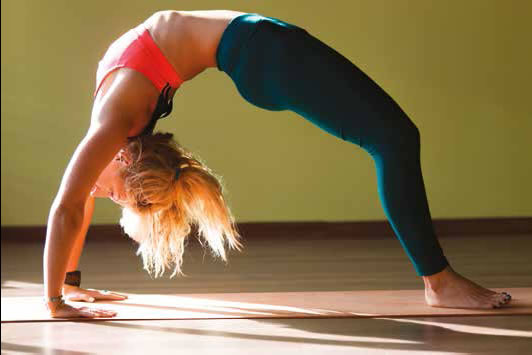In our regular keep fit series Sarbani Sen took a tour of the different yoga classes available in the capital.
My keep fit yoga-style journey started in Venice, California, three months ago. Suddenly, in the midst of a Bikram Yoga class, sweaty me realizes that I love it! I’m exhilarated by sweat and joy – I felt a bliss shiver along my spine. I had had private yoga tuition at home once a couple of months ago. I found it interesting, but not ‘wow!’ This was different: the heat, the flow and the energy contributed to an ecstasy in body and soul. I am a Reconnection dance teacher, and I integrate yoga postures into my classes, but this was so joyful that I decided to find myself a class I could fall in love with in Brussels too and get my butt out there for some real yoga.
Back in Brussels, I started checking out schools. I realized that there are three main styles here: Ashtanga (Vinyasa), Iyengar and Brikam or Hot Yoga.
Ashtanga is a system of yoga transmitted to the modern world by Sri K. Pattabhi Jois (1915-2009). This method of yoga involves synchronizing breath with a progressive series of postures – a process producing intense internal heat and a profuse, purifying sweat that detoxifies muscles and organs. It is an intensely physical and athletic style of yoga.
Iyengar Yoga is a form of Hatha Yoga in which there is a focus on the structural alignment of the physical body through the development of asanas (postures). It aims to unite the body, mind and spirit for health and wellbeing. Iyengar differs from the other styles of yoga by three key elements: technique, sequence and timing. Technique refers to the precision of the body alignment and the performance of pranayama. Sequence means the sequences in which asanas and breathing exercises are practiced. Following the specific sequence is important in achieving the desired result, because only the combination of certain poses and breathing techniques can ensure the expected positive effect. Timing is the third key element which defines the time spent in each pose.
Hot yoga refers to yoga exercises performed under hot, humid conditions. Often associated with the style devised by Bikram Choudhury, hot yoga is now used to describe any number of yoga styles that use heat to increase an individual’s flexibility in the poses.
So I started my journey and headed to a small yoga place I had wanted to try for some time: the Yoga Sala, located under the Cellule 133 in Forest, a beautiful very discreet, Spartan, yet stylish place. It is somehow Indo-Californian in a way as a White Tara welcomes you on a wall and vintage objects are placed here and there. Here each (regular) student receives a little booklet in which he is requested to describe his physical problems, challenges and goals for the next six months of yoga practice. This makes the practice an intense one – it is a great motivator.
The course begins with a seated introduction and a snapshot of your current state of mind and body. Then you go through a sequence of standing postures, some inversions (tripod and candle usually) with preparatory exercises for those who are not ready or hesitant. The course ends with relaxation. The course here is built on Iyengar philosophy and methodology, as designed by the Master, with each month covering four themes.
Week 1: standing postures
Week 2: forward bend and/or twisting
Week 3: arch
Week 4: prayanama (breathing)







